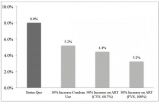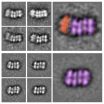(Press-News.org) COLUMBIA, Mo. – According to the Centers for Disease Control and Prevention (CDC), many teens skip breakfast, which increases their likelihood of overeating and eventual weight gain. Statistics show that the number of adolescents struggling with obesity, which elevates the risk for chronic health problems, has quadrupled in the past three decades. Now, MU researchers have found that eating breakfast, particularly meals rich in protein, increases young adults' levels of a brain chemical associated with feelings of reward, which may reduce food cravings and overeating later in the day. Understanding the brain chemical and its role in food cravings could lead to improvements in obesity prevention and treatment.
"Our research showed that people experience a dramatic decline in cravings for sweet foods when they eat breakfast," said Heather Leidy, an assistant professor of nutrition and exercise physiology. "However, breakfasts that are high in protein also reduced cravings for savory – or high-fat – foods. On the other hand, if breakfast is skipped, these cravings continue to rise throughout the day."
Leidy studied the effects of different breakfasts on participants' levels of dopamine, a brain chemical involved in moderating impulses and reward, including food cravings. Dopamine levels were determined by measuring homovanillic acid (HVA), the main dopamine metabolite. Eating initiates a release of dopamine, which stimulates feelings of food reward. The reward response is an important part of eating because it helps to regulate food intake, Leidy said.
"Dopamine levels are blunted in individuals who are overweight or obese, which means that it takes much more stimulation – or food – to elicit feelings of reward; we saw similar responses within breakfast-skippers," Leidy said. "To counteract the tendencies to overeat and to prevent weight gain that occurs as a result of overeating, we tried to identify dietary behaviors that provide these feelings of reward while reducing cravings for high-fat foods. Eating breakfast, particularly a breakfast high in protein, seems to do that."
Participants in the study were young women with an average age of 19; however, Leidy said the findings may be generalized to a larger population of adults.
"In the U.S., people are skipping breakfast more frequently, which is associated with food cravings, overeating and obesity," Leidy said. "It used to be that nearly 100 percent of American adults, kids and teens were eating breakfast, but over the last 50 years, we have seen a decrease in eating frequency and an increase in obesity."
INFORMATION:
Leidy's research was published in the Nutrition Journal. Other MU researchers on the study included Matthew Will, an associate professor of psychological sciences, and Heather Hoertel, who conducted the study as part of the requirements for her master's thesis. The research was funded by the Beef Checkoff Program, the Egg Nutrition Center and the Margaret Flynn Award from the University of Missouri.
The Department of Nutrition and Exercise Physiology is jointly administered by the College of Agriculture, Food and Natural Resources, the College of Human Environmental Sciences and the School of Medicine.
Eating breakfast increases brain chemical involved in regulating food intake and cravings
Breakfast-skippers have lower dopamine levels, which can lead to overeating and eventual weight gain
2014-10-15
ELSE PRESS RELEASES FROM THIS DATE:
Study models ways to cut Mexico's HIV rates
2014-10-15
PROVIDENCE, R.I. [Brown University] — To address the HIV epidemic in Mexico is to address it among men who have sex with men (MSM), because they account for a large percentage of the country's new infections, says Omar Galárraga, assistant professor of health services policy and practice in the Brown University School of Public Health.
A major source of the new infections is Mexico City's male-to-male sex trade, Galárraga has found. In his research, including detailed interviews and testing with hundreds of male sex workers on the city's streets and in ...
Product placement can curb TV commercial audience loss by more than 10 percent: INFORMS study
2014-10-15
Coordinating product placement with advertising in the same television program can reduce audience loss over commercial breaks by 10%, according to a new study in the Articles in Advance section of Marketing Science, a journal of the Institute for Operations Research and the Management Sciences (INFORMS).
Synergy or Interference: The Effect of Product Placement on Commercial Break Audience Decline is by David A. Schweidel, Associate Professor of Marketing at Goizueta Business School, Emory University, Natasha Zhang Foutz, Assistant Professor of Marketing at McIntire School ...
Key moment mapped in assembly of DNA-splitting molecular machine
2014-10-15
UPTON, NY—The proteins that drive DNA replication—the force behind cellular growth and reproduction—are some of the most complex machines on Earth. The multistep replication process involves hundreds of atomic-scale moving parts that rapidly interact and transform. Mapping that dense molecular machinery is one of the most promising and challenging frontiers in medicine and biology.
Now, scientists have pinpointed crucial steps in the beginning of the replication process, including surprising structural details about the enzyme that "unzips" and splits ...
ORNL research reveals unique capabilities of 3-D printing
2014-10-15
OAK RIDGE, Tenn., Oct. 15, 2014—Researchers at the Department of Energy's Oak Ridge National Laboratory have demonstrated an additive manufacturing method to control the structure and properties of metal components with precision unmatched by conventional manufacturing processes.
Ryan Dehoff, staff scientist and metal additive manufacturing lead at the Department of Energy's Manufacturing Demonstration Facility at ORNL, presented the research this week in an invited presentation at the Materials Science & Technology 2014 conference in Pittsburgh.
"We can now ...
Transforming safety net practices into patient-centered medical homes -- progress report
2014-10-15
October 15, 2014 – A recently concluded demonstration project made meaningful progress toward introducing a "patient-centered medical home" approach at "safety net" practices serving vulnerable and underserved populations. Lessons learned in the course of developing and implementing the Safety Net Medical Home Initiative (SNMHI) are featured in a special November supplement to Medical Care. The journal is published by Lippincott Williams & Wilkins, a part of Wolters Kluwer Health.
The supplement presents nine original papers sharing "experience and learning" from ...
Bullies in the workplace
2014-10-15
AMES, Iowa – The stories are shocking and heartbreaking, but they are often disjointed and hard to follow. In severe cases, the narratives are even more chaotic. This is reality for victims of workplace bullying and a major reason why they stay silent, said Stacy Tye-Williams, an assistant professor of communications studies and English at Iowa State University.
No one expects to go to work and feel as though they are back on the school playground, but bullying is all too common for many workers. Approximately 54 million workers, or 35 percent of U.S. employees, ...
Sharks that hide in coral reefs may be safe from acidifying oceans
2014-10-15
A study published online today in the journal Conservation Physiology has shown that the epaulette shark (Hemiscyllium ocellatum) displays physiological tolerance to elevated carbon dioxide (CO2) in its environment after being exposed to CO2 levels equivalent to those that are predicted for their natural habitats in the near future.
Atmospheric CO2 levels have increased by almost 40% in the last 250 years, and the world's oceans have absorbed more than 30% of the additional CO2. The resulting rise in seawater CO2 and associated reduction in pH – known as ocean ...
Sheltering habits help sharks cope with acid oceans
2014-10-15
A shark's habitat can reduce its sensitivity to rising CO2 levels, according to Australian scientists.
Globally, ocean acidification - linked to emissions of greenhouse gases - remains a major concern and scientists say it will harm many marine species over the next century.
Researchers from the ARC Centre of Excellence for Coral Reef Studies (Coral CoE) at James Cook University have found that the epaulette shark, a species that shelters within reefs and copes with low oxygen levels, is able to tolerate increased carbon dioxide in the water without any obvious physical ...
Subsidies help breast cancer patients adhere to hormone therapy
2014-10-15
A federal prescription-subsidy program for low-income women on Medicare significantly improved their adherence to hormone therapy to prevent the recurrence of breast cancer after surgery.
"Our findings suggest that out-of-pocket costs are a significant barrier" to women complying with hormone therapy, said Dr. Alana Biggers, assistant professor of clinical medicine at the University of Illinois at Chicago College of Medicine, and lead investigator on the study. Programs that lower these costs can "improve adherence -- and, hopefully, breast cancer outcomes -- for low-income ...
Dolphin 'breathalyzer' could help diagnose animal and ocean health
2014-10-15
Alcohol consumption isn't the only thing a breath analysis can reveal. Scientists have been studying its possible use for diagnosing a wide range of conditions in humans — and now in the beloved bottlenose dolphin. In a report in the ACS journal Analytical Chemistry, one team describes a new instrument that can analyze the metabolites in breath from dolphins, which have been dying in alarming numbers along the Atlantic coast this year.
Cristina E. Davis and colleagues note that studying dolphins' health is about more than preserving their populations — the ...
LAST 30 PRESS RELEASES:
Medicare patients get different stroke care depending on plan, analysis reveals
Polyploidy-induced senescence may drive aging, tissue repair, and cancer risk
Study shows that treating patients with lifestyle medicine may help reduce clinician burnout
Experimental and numerical framework for acoustic streaming prediction in mid-air phased arrays
Ancestral motif enables broad DNA binding by NIN, a master regulator of rhizobial symbiosis
Macrophage immune cells need constant reminders to retain memories of prior infections
Ultra-endurance running may accelerate aging and breakdown of red blood cells
Ancient mind-body practice proven to lower blood pressure in clinical trial
SwRI to create advanced Product Lifecycle Management system for the Air Force
Natural selection operates on multiple levels, comprehensive review of scientific studies shows
Developing a national research program on liquid metals for fusion
AI-powered ECG could help guide lifelong heart monitoring for patients with repaired tetralogy of fallot
Global shark bites return to average in 2025, with a smaller proportion in the United States
Millions are unaware of heart risks that don’t start in the heart
What freezing plants in blocks of ice can tell us about the future of Svalbard’s plant communities
A new vascularized tissueoid-on-a-chip model for liver regeneration and transplant rejection
Augmented reality menus may help restaurants attract more customers, improve brand perceptions
Power grids to epidemics: study shows small patterns trigger systemic failures
Computational insights into the interactions of andrographolide derivative SRJ09 with histone deacetylase for the management of beta thalassemia
A genetic brake that forms our muscles
CHEST announces first class of certified critical care advanced practice providers awarded CCAPP Designation
Jeonbuk National University researchers develop an innovative prussian-blue based electrode for effective and efficient cesium removal
Self-organization of cell-sized chiral rotating actin rings driven by a chiral myosin
Report: US history polarizes generations, but has potential to unite
Tiny bubbles, big breakthrough: Cracking cancer’s “fortress”
A biological material that becomes stronger when wet could replace plastics
Glacial feast: Seals caught closer to glaciers had fuller stomachs
Get the picture? High-tech, low-cost lens focuses on global consumer markets
Antimicrobial resistance in foodborne bacteria remains a public health concern in Europe
Safer batteries for storing energy at massive scale
[Press-News.org] Eating breakfast increases brain chemical involved in regulating food intake and cravingsBreakfast-skippers have lower dopamine levels, which can lead to overeating and eventual weight gain






